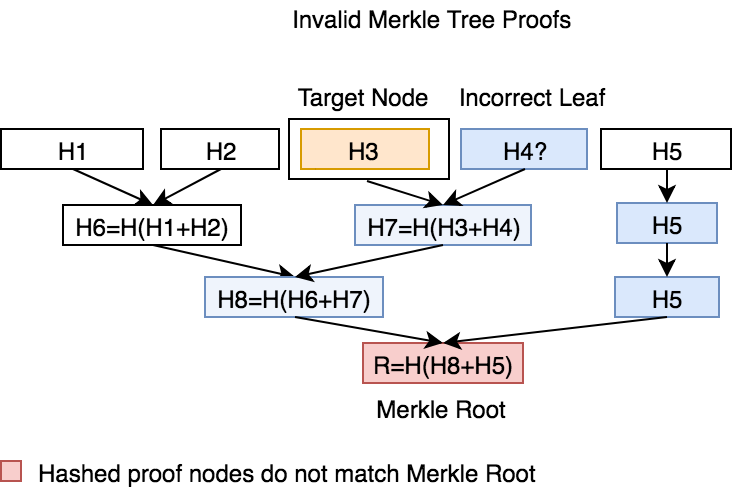Construct Merkle Trees and verify proofs in JavaScript.
Diagram of Merkle Tree
Diagram of Merkle Tree Proof
Diagram of Invalid Merkle Tree Proofs
Diagram of Bitcoin Merkle Tree
npm install merkletreejsConstruct tree, generate proof, and verify proof:
const { MerkleTree } = require('merkletreejs')
const SHA256 = require('crypto-js/sha256')
const leaves = ['a', 'b', 'c'].map(x => SHA256(x))
const tree = new MerkleTree(leaves, SHA256)
const root = tree.getRoot().toString('hex')
const leaf = SHA256('a')
const proof = tree.getProof(leaf)
console.log(tree.verify(proof, leaf, root)) // true
const badLeaves = ['a', 'x', 'c'].map(x => SHA256(x))
const badTree = new MerkleTree(badLeaves, SHA256)
const badLeaf = SHA256('x')
const badProof = tree.getProof(badLeaf)
console.log(tree.verify(badProof, leaf, root)) // falsePrint tree to console:
MerkleTree.print(tree)Output
└─ 311d2e46f49b15fff8b746b74ad57f2cc9e0d9939fda94387141a2d3fdf187ae
├─ 176f0f307632fdd5831875eb709e2f68d770b102262998b214ddeb3f04164ae1
│ ├─ 3ac225168df54212a25c1c01fd35bebfea408fdac2e31ddd6f80a4bbf9a5f1cb
│ └─ b5553de315e0edf504d9150af82dafa5c4667fa618ed0a6f19c69b41166c5510
└─ 0b42b6393c1f53060fe3ddbfcd7aadcca894465a5a438f69c87d790b2299b9b2
└─ 0b42b6393c1f53060fe3ddbfcd7aadcca894465a5a438f69c87d790b2299b9b2Class reprensenting a Merkle Tree
namespace: MerkleTree
MerkleTree
- createHashes
- getLayers
- getLayersAsObject
- getLeaves
- getProof
- getRoot
- toString
- toTreeString
- verify
- bufferify
⊕ new MerkleTree(leaves: any, hashAlgorithm: any, options?: *Options
desc: Constructs a Merkle Tree. All nodes and leaves are stored as Buffers. Lonely leaf nodes are promoted to the next level up without being hashed again.
example:
const MerkleTree = require('merkletreejs')
const crypto = require('crypto')
function sha256(data) {
// returns Buffer
return crypto.createHash('sha256').update(data).digest()
}
const leaves = ['a', 'b', 'c'].map(x => keccak(x))
const tree = new MerkleTree(leaves, sha256)Parameters:
| Name | Type | Default value | Description |
|---|---|---|---|
| leaves | any |
- | Array of hashed leaves. Each leaf must be a Buffer. |
| hashAlgorithm | any |
- | Algorithm used for hashing leaves and nodes |
Default value options |
Options | {} as any | Additional options |
Returns: MerkleTree
● duplicateOdd: boolean
● hashAlgo: function
▸(value: any): any
Parameters:
| Name | Type |
|---|---|
| value | any |
Returns: any
● hashLeaves: boolean
● isBitcoinTree: boolean
● layers: any[]
● leaves: any[]
● sortLeaves: boolean
● sortPairs: boolean
▸ createHashes(nodes: any): void
Parameters:
| Name | Type |
|---|---|
| nodes | any |
Returns: void
▸ getLayers(): any[]
getLayers
desc: Returns array of all layers of Merkle Tree, including leaves and root.
example:
const layers = tree.getLayers()Returns: any[]
▸ getLayersAsObject(): any
Returns: any
▸ getLeaves(): any[]
getLeaves
desc: Returns array of leaves of Merkle Tree.
example:
const leaves = tree.getLeaves()Returns: any[]
▸ getProof(leaf: any, index?: any): any[]
getProof
desc: Returns the proof for a target leaf.
example:
const proof = tree.getProof(leaves[2])example:
const leaves = ['a', 'b', 'a'].map(x => keccak(x))
const tree = new MerkleTree(leaves, keccak)
const proof = tree.getProof(leaves[2], 2)Parameters:
| Name | Type | Description |
|---|---|---|
| leaf | any |
Target leaf |
Optional index |
any |
Returns: any[]
- Array of objects containing a position property of type string with values of 'left' or 'right' and a data property of type Buffer.
▸ getRoot(): any
getRoot
desc: Returns the Merkle root hash as a Buffer.
example:
const root = tree.getRoot()Returns: any
▸ print(): void
Returns: void
▸ toString(): any
Returns: any
▸ toTreeString(): any
Returns: any
▸ verify(proof: any, targetNode: any, root: any): boolean
verify
desc: Returns true if the proof path (array of hashes) can connect the target node to the Merkle root.
example:
const root = tree.getRoot()
const proof = tree.getProof(leaves[2])
const verified = tree.verify(proof, leaves[2], root)Parameters:
| Name | Type | Description |
|---|---|---|
| proof | any |
Array of proof objects that should connect target node to Merkle root. |
| targetNode | any |
Target node Buffer |
| root | any |
Merkle root Buffer |
Returns: boolean
▸ bufferify(x: any): any
Parameters:
| Name | Type |
|---|---|
| x | any |
Returns: any
▸ print(tree: any): void
Parameters:
| Name | Type |
|---|---|
| tree | any |
Returns: void
● duplicateOdd: boolean
If set to true, an odd node will be duplicated and combined to make a pair to generate the layer hash.
● hashLeaves: boolean
If set to true, the leaves will hashed using the set hashing algorithms.
● isBitcoinTree: boolean
If set to true, constructs the Merkle Tree using the Bitcoin Merkle Tree implementation. Enable it when you need to replicate Bitcoin constructed Merkle Trees. In Bitcoin Merkle Trees, single nodes are combined with themselves, and each output hash is hashed again.
● sort: boolean
If set to true, the leaves and hashing pairs will be sorted.
● sortLeaves: boolean
If set to true, the leaves will be sorted.
● sortPairs: boolean
If set to true, the hashing pairs will be sorted.
npm test- Q: How do you verify merkle proofs in Solidity?
- A: Check out the example repo merkletreejs-solidity on how to generate merkle proofs with this library and verify them in Solidity.
As is, this implemenation is vulnerable to a second pre-image attack. Use a difference hashing algorithm function for leaves and nodes, so that H(x) != H'(x).
Also, as is, this implementation is vulnerable to a forgery attack for an unbalanced tree, where the last leaf node can be duplicated to create an artificial balanced tree, resulting in the same Merkle root hash. Do not accept unbalanced tree to prevent this.
More info here.






